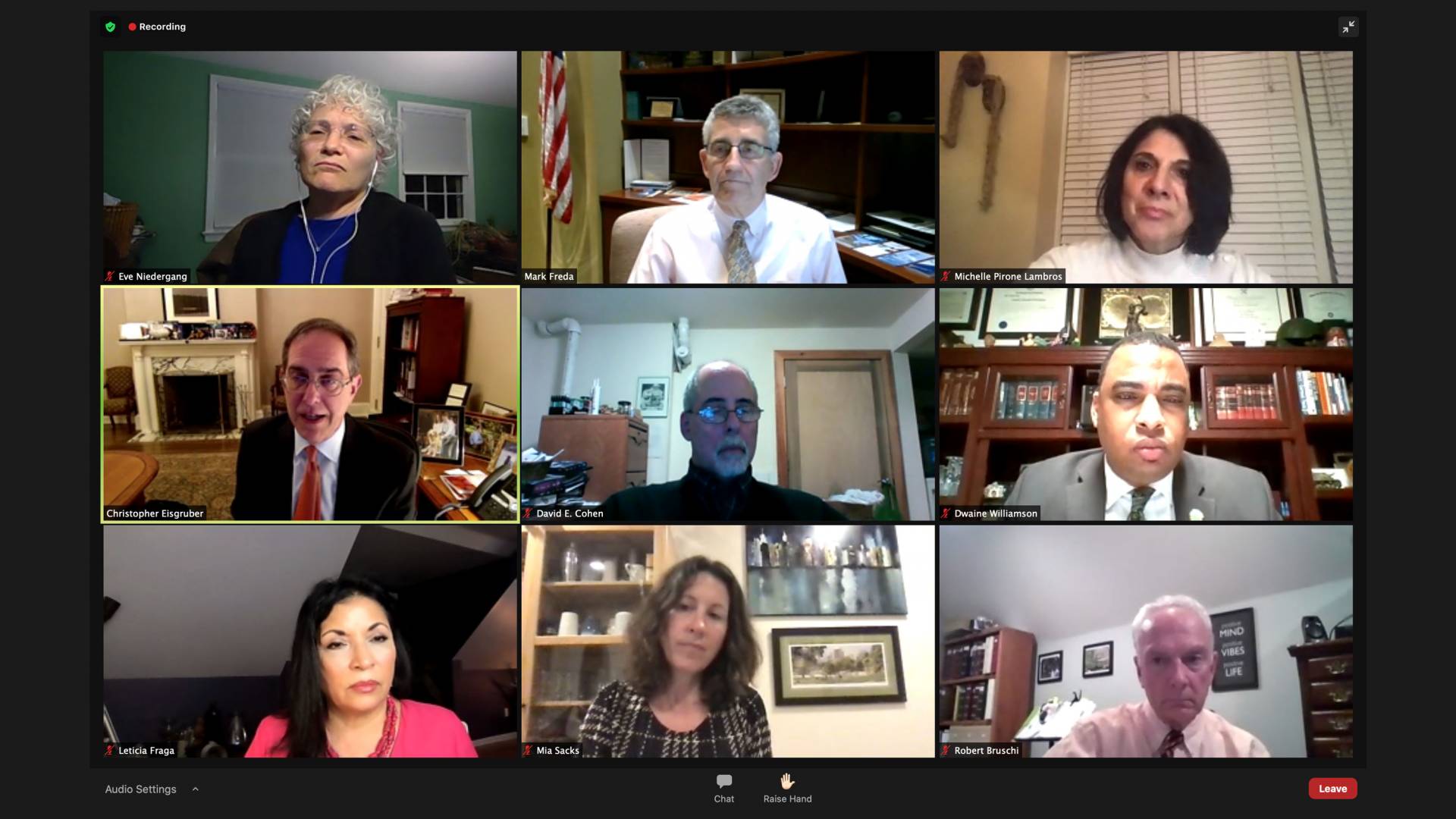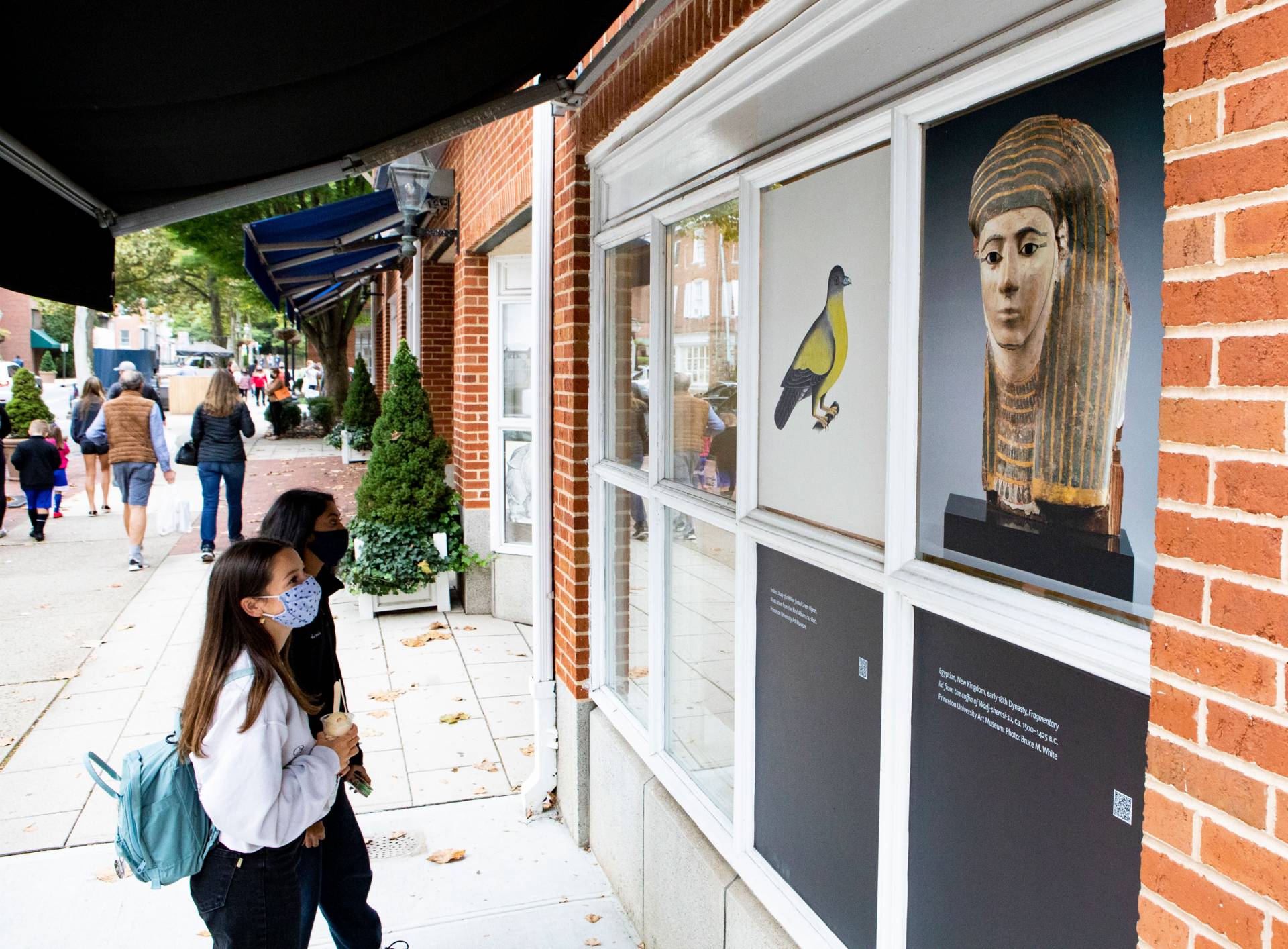Eisgruber, Princeton officials underscore the mutual benefits of partnership during the pandemic
Princeton University President Christopher L. Eisgruber joined Princeton municipal officials Tuesday, March 30, to discuss mutual interests impacting the University and the community, highlighting their cooperation on planning and various relief initiatives during the COVID-19 pandemic.
The annual town-gown meeting was held on Zoom due to continuing pandemic-related health guidelines, bringing together Eisgruber with Princeton Mayor Mark Freda and Princeton Council members, albeit virtually.
“I have felt throughout my time as president of the University that it has been very important to keep channels of communication open between the town and the University,” Eisgruber said in his opening remarks. “That’s true, in general. I think it has been more true than ever over the past year as we have dealt with a set of unprecedented crises that have tested both town and University, and, I think created challenging leadership decisions for all of us.”

Princeton University President Christopher L. Eisgruber (middle row, far left) joins Princeton municipal officials via Zoom for their annual discussion of mutual interests.
“Even though it’s an overused phrase, ‘stronger together’ really describes how we have approached the pandemic,” said council member Mia Sacks. “It’s been an amazing partnership this past year, and it’s hard to imagine more extreme circumstances. The fact that we could partner so successfully under such difficult circumstances, I feel, bodes well for less challenging circumstances, and I feel that we’ll continue to build on all the channels of communication and cooperation that we have developed in the past year.”
In advance of the meeting, the University prepared a summary of various contributions to and partnerships with the town in 2020, including: the $4.03 million voluntary contribution to the municipality; $11.7 million in property and sewer taxes (making the University the largest property taxpayer in Princeton); $500,000 to establish the community’s Transportation Trust Fund; mutual aid and in-service training for Princeton police and fire personnel; and countless student volunteer initiatives within the community.
For decades, Princeton University has made voluntary contributions to the Municipality of Princeton. In late 2020, the municipality and the University agreed to a two-year extension of the existing contributions agreement that had been adopted in 2014. Under the new 2020 agreement, the University will contribute nearly $8.5 million to the municipality in the next two years. The agreement includes a $850,000 commitment to support the hiring of career personnel for the Princeton Fire Department and a $250,000 commitment toward the construction of a new storage facility for the municipal Department of Public Works.
Since the earliest days of the pandemic, the University also has worked with community partners to support local COVID-19 relief efforts. These include the establishment of the $1 million Princeton University Relief Fund to provide direct financial support to community organizations and businesses. Of those monies, $400,000 benefitted the Princeton Area Community Foundation COVID Relief Fund, $100,000 was distributed to the Coronavirus Emergency Relief Fund coordinated by the Princeton Children’s Fund, and $350,000 launched the Princeton Small Business Resiliency Fund.
Additional initiatives included the Summer Food and Nutrition Program that provided 43,000 meals to food insecure individuals and families in the Princeton area, donation of Personal Protective Equipment (PPE) to local first responders, hosting community blood drives, and creation of an online tutoring program to assist area school children.
Eisgruber thanked municipal health officer Jeffrey Grosser for his assistance in advising the University in its decision-making for campus operations in fall 2020 and spring 2021. Although Princeton did not invite undergraduate students back in the fall, it was able to do so for the spring semester. “The advice we received from public health authorities was important to our decision-making,” Eisgruber said.
Eisgruber reiterated that the University stands ready to work with local officials and act as a vaccine distribution site, if called upon by the county and state.
“It’s an extremely generous offer, and I know it comes at a significant expense to the University to provide that,” Freda said. “It’s a tremendous thing to do for the community.”
Freda and others also recognized the University’s overall pandemic-related support. “Those are immeasurable efforts,” he said. “It’s a long term investment in the community, and it means so much to so many.”
Council member Leticia Fraga said rental assistance and assistance with utilities to vulnerable residents “really, truly provided a lifeline for them,” especially those who did not qualify for unemployment or for stimulus checks.
Support for businesses also was critical, said council member Michelle Pirone Lambros. “The recovery resiliency fund really helped those 90-some businesses,” Lambros said. “Unfortunately, we didn’t save them all. But it made a huge impact.”

Maintaining the vibrancy of Princeton’s business district was a priority for the University in 2020. In addition to Art for the Streets (shown), the University established a $1 million pandemic relief fund to provide direct financial support to the community, of which $350,000 launched the Princeton Small Business Resiliency Fund. Students also offered a hand through Tigers for Nassau, an initiative that provided web and marketing assistance to business owners to assist in their recovery.
In addition to providing financial support, Lambros cited the volunteer work of Princeton University students who participated in Tigers for Nassau, an initiative that provided web and marketing assistance to local business owners to assist in their recovery.
Other areas where the municipality and University have collaborated this past year include environmental initiatives. Council member David Cohen thanked Eisgruber for the University’s input in developing new bicycle parking ordinance and stormwater management ordinances. “I so much appreciate the forward-thinking environmental perspective that the University brings,” Cohen said.
Several council members recognized the work of Kristin Appelget, Princeton’s director of community and regional affairs, as key to the success of a variety of town-gown partnerships.
Eisgruber seconded their praise. “She has done so much to improve the level of communication between town and University,” he said. “She gets into the details, understands what will make a difference for the better, and I think that’s one of the principal reasons we have been able to have such a strong partnership during this very demanding time.”
Council members indicated the importance of maintaining open communication and fostering healthy collaboration, not only during a time of crisis, but also for the long-term benefit of all.
“The University has certainly helped the town to be a leader and an example to other municipalities in New Jersey and to towns around the entire country about what makes a town a great place to live,” said council member Dwaine Williamson.

